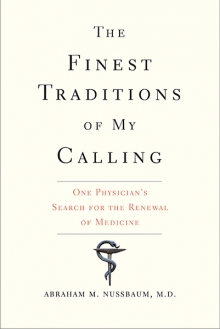Five Questions Every Patient Should Ask When Interviewing A Physician
Abraham Nussbaum—
Physicians are used to asking questions—Where does it hurt? How long has it been bothering you? Did you mean to stick that up there?—but when a patient is seeking a new physician, she needs to ask her own questions.
The healthcare industry encourages patients to ask questions—Where did you train? Are you board certified? How many times have you performed this procedure?—to which a physician already knows the answers. Just as the best physicians ask unexpected questions which secure an obscure diagnosis or reassure an anxious person, patients should also ask unexpected questions.
Every day, I teach medical students and residents how to ask unexpected questions. The best questions gather information while building the alliance between a patient and her physician. When seeking a new physician, try these five questions:
- What do you love about being a physician? In national surveys, a majority of physicians report that they are burned out by the practice of medicine and would discourage a young person from becoming a physician. If possible, select a physician who still finds meaning in seeing people as patients.
- What is the mission of your practice? Despite the good intentions of healthcare reform, the real changes in healthcare are being driven by corporate models designed to maximize profit. The profits do not accrue to patients, so you want a physician who understands medicine as a calling, not just a job.
- How do you stay current with medical information? By some estimates, 150,000 scientific articles are published each month. Physicians live with information overload and rapid scientific change, so you need a physician who has developed habits for sifting through what passes for scientific knowledge to find clinical wisdom.
- If I have questions after my appointment, what is the best way to contact you? Whether you are seeing a physician for a routine visit or an acute concern, it can be difficult to remember everything spoken during a patient-physician encounter. When you have further questions or develop complications, you need a timely way to engage your physician or her practice.
- What resources can you recommend for me to learn about my health outside of our visits? While a physician can partner with you in the pursuit of health, it is ultimately your pursuit and your health. Ask a physician to suggest books, websites, podcasts, cookbooks, support groups, or community resources to help you increase your health literacy. Any physician who suggests only pills and procedures is not the physician for you.
If you are worried about asking questions, remember that physicians ask invasive questions for a living—Are you sexually active? Do you ever use illicit drugs? Do you have insurance?—so it is only fair for them to answer a few of your questions. You are looking to partner with a physician who shares your interest in advancing your health. A good physician will appreciate the chance to speak about herself, her practice, and how she can help achieve health.
There is a storied physician oath, attributed to Maimondes, where a physician swears to “never see in the patient anything but a fellow creature in pain.” If you ask unexpected questions which build an alliance between you and your physician, you can see each other as fellow creatures pursuing health.
Abraham M. Nussbaum, M.D., directs the adult inpatient psychiatry unit at Denver Health, where he also trains medical students and residents. He is assistant professor, Department of Psychiatry, University of Colorado School of Medicine, and author of the best-selling The Pocket Guide to the DSM-5 Diagnostic Exam. He lives in Denver, CO.
Further reading:




























So, I should call a physician’s office and ask of the receptionist, “I would like to schedule an interview to ask questions of Dr. X in order to decide whether to hire her as my physician?” Has anyone ever done that? How will the physician find time for the checklist? Won’t most physicians conclude that I intend to be a ‘difficult’ patient? Maybe that works during a 50-minute hour, but by the time it takes for 2-3 answers, my primary physician’s assistant will have rapped several times on the door to announce that time (usually 12 minutes) is up. Of course, with the prospect of a future joint replacement, bypass, or robotic surgery, specialists will indeed spend the time explaining how their skills will meet your needs. I would have to endure countless initial “comprehensive” exams until I found myself in the office of a primary physician who meets my (and your) criteria.
I enjoyed “Finest Traditions…” Bravo!